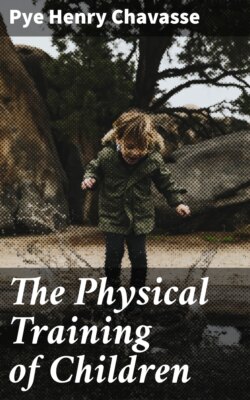Читать книгу The Physical Training of Children - Pye Henry Chavasse - Страница 5
На сайте Литреса книга снята с продажи.
PRELIMINARY CONVERSATION.
ОглавлениеTable of Contents
1. I wish to consult you on many subjects appertaining to the management and the care of children,—will you favor me with your advice and counsel?
I shall be happy to accede to your request, and to give you the fruits of my experience in the clearest manner I am able, and in the simplest language I can command—freed from all technicalities. I will endeavor to guide you in the management of the health of your offspring;—I will describe to you the symptoms of the diseases of children;—I will warn you of approaching danger, in order that you may promptly apply for medical assistance before disease has gained too firm a footing;—I will give you the treatment on the moment of some of their more pressing illnesses—when medical aid cannot quickly be procured, and where delay may be death;—I will instruct you in case of accidents, on the immediate employment of remedies—where procrastination may be dangerous; I will tell you how a sick child should be nursed, and how a sick room ought to be managed;—I will use my best energy to banish injurious practices from the nursery;—I will treat of the means to prevent disease where it be possible;—I will show you the way to preserve the health of the healthy,—and how to strengthen the delicate;—and will strive to make a medical man’s task more agreeable to himself,—and more beneficial to his patient,—by dispelling errors and prejudices, and by proving the importance of your strictly adhering to his rules. If I can accomplish any of these objects, I shall be amply repaid by the pleasing satisfaction that I have been of some little service to the rising generation.
2. Then you consider it important that I should be made acquainted with, and be well informed upon, the subjects you have just named?
Certainly. I deem it to be your imperative duty to study the subject well. The proper management of children is a vital question,—a mother’s question,—and the most important that can be brought under the consideration of a parent; and, strange to say, it is one that has been more neglected than any other. How many mothers undertake the responsible management of children without previous instruction, or without forethought; they undertake it as though it may be learned either by intuition or by instinct or by affection! The consequence is, that frequently they are in a sea of trouble and uncertainty, tossing about without either rule or compass; until, too often, their hopes and treasures are shipwrecked and lost!
The care and management, and consequently the health and future well-doing of the child, principally devolve upon the mother; “for it is the mother after all that has most to do with the making or the marring of the man.” Dr. Guthrie justly remarks that—“Moses might never have been the man he was unless he had been nursed by his own mother. How many celebrated men have owed their greatness and their goodness to a mother’s training!” Napoleon owed much to his mother. “‘The fate of a child,’ said Napoleon, ‘is always the work of his mother;’ and this extraordinary man took pleasure in repeating, that to his mother he owed his elevation. All history confirms this opinion.... The character of the mother influences the children more than that of the father, because it is more exposed to their daily, hourly observation.”
I am not overstating the importance of the subject in hand when I say that a child is the most valuable treasure in the world, that “he is the precious gift of God,” that he is the source of a mother’s greatest and purest enjoyment, that he is the strongest bond of affection between her and her husband, and that
“A babe in a house is a well-spring of pleasure,
A messenger of peace and love.”
In the writing of the following pages I have had one object constantly in view—namely, health—
“That salt of life, which does to all a relish give;
Its standing pleasure, and intrinsic wealth,
The body’s virtue, and the soul’s good fortune—health.”
